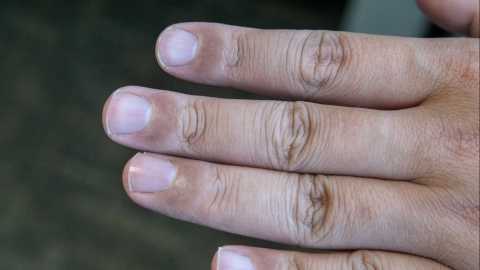How to treat finger clumsiness for recovery
Generally, finger inflexibility may be caused by factors such as hand muscle fatigue, prolonged poor posture, tenosynovitis, rheumatoid arthritis, or sequelae of cerebral infarction. It is recommended to seek medical attention promptly, identify the underlying cause, and then improve symptoms under a doctor's guidance through general treatments, medications, and other methods. Specific analyses are as follows:

1. Hand muscle fatigue: Prolonged manual labor or frequent finger movements can lead to excessive muscle fatigue, resulting in finger inflexibility. Reduce working time involving hands, avoid repeating the same motion for extended periods, soak hands in warm water for 10–15 minutes during breaks, and gently massage hand muscles to relieve fatigue.
2. Prolonged poor posture: Frequently bending fingers or applying pressure on the hand can impair blood circulation and muscle function, leading to restricted finger movement. Adjust hand posture, avoid keeping fingers bent for long periods, maintain a naturally relaxed hand position during work or rest, and perform simple exercises such as finger stretching and fist clenching to promote blood circulation.
3. Tenosynovitis: Frequent finger movement causes friction between tendons and tendon sheaths, triggering inflammation and resulting in pain and reduced mobility. Patients should follow medical advice to use medications such as diclofenac diethylamine gel, ibuprofen gel, or naproxen sodium tablets to alleviate symptoms.
4. Rheumatoid arthritis: Autoimmune abnormalities trigger joint inflammation affecting the finger joints, causing swelling, stiffness, and reduced flexibility. Patients should take medications such as methotrexate tablets, leflunomide tablets, or hydroxychloroquine sulfate tablets as prescribed to control disease progression.
5. Sequelae of cerebral infarction: Brain damage from cerebral infarction affects nerve control of the hand, leading to finger inflexibility and movement impairment. Patients should undergo hand rehabilitation training under medical guidance, such as grip exercises and fine motor skill training. Additionally, they should take medications like enteric-coated aspirin tablets, clopidogrel hydrogen sulfate tablets, or citicoline sodium capsules as directed to support neurological recovery.
Daily care should include keeping the hands warm and avoiding cold exposure or overuse. Diet-wise, consume adequate protein- and vitamin-rich foods such as eggs, milk, fresh vegetables, and fruits to provide essential nutrients for tissue repair and nerve regeneration, thereby supporting functional recovery of the fingers.




